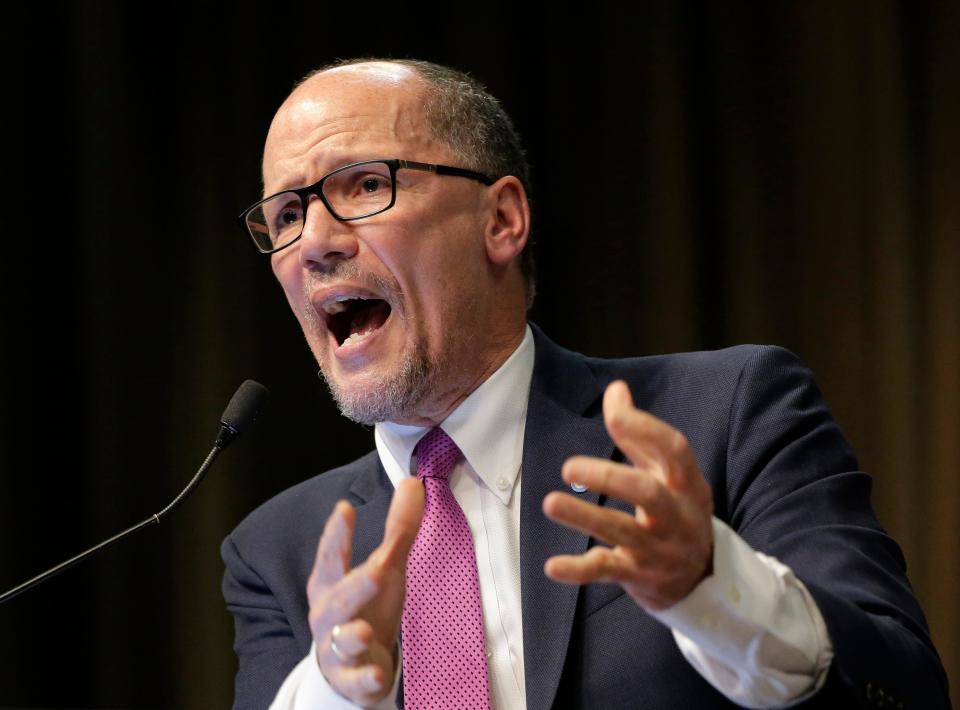It just got harder to make the later 2020 Democratic debates

It’s going to be more difficult for Democratic presidential candidates to the make the stage of the third and fourth debates, according to new qualifying rules released by the Democratic National Committee Wednesday.
For debates scheduled for September and October, candidates will have to hit 2% in four qualifying polls and tally at least 130,000 individual donors, according to the DNC guidance. For the first and second rounds of debates, the DNC is requiring candidates to either hit at least 1% in three polls or receive campaign contributions from at least 65,000 donors.
The higher polling threshold could certainly narrow who from the nearly two dozen candidate field will make it to the stage. So far, eight candidates have hit received 2% or more support in four national or early-state voting polls: Joe Biden, Bernie Sanders, Elizabeth Warren, Kamala Harris, Amy Klobuchar, Cory Booker, Pete Buttigieg and Beto O’Rourke.

Can Biden's lead hold? 2020 frontrunner in May? It's probably not a good thing
Where things stand: What you need to know about the 2020 election so far
For the September debate, each poll must be publicly released between June 28, 2019, and August 28, 2019. The DNC said it will announce deadlines for qualifying polls ahead of the October debate will be released in the future.
The approved polling includes surveys conducted by the Associated Press, ABC News, CBS News, CNN, Des Moines Register, Fox News, Monmouth University, NBC News, New York Times, National Public Radio (NPR), Quinnipiac University, University of New Hampshire, Wall Street Journal, USA Today, Washington Post, and Winthrop University.
The DNC also announced Wednesday that the third debate will be hosted on Sept. 12 by ABC News, in partnership with Univision. A second night of debating will be held to accommodate a large field if necessary, according to the DNC.
The first debate is scheduled to be held over two nights on June 26 and 27 in Miami, and the second round is scheduled for July 30 and 31 in Detroit.
The campaigns of Biden, Sanders, Harris, Warren, Buttigieg, O’Rourke, Booker as well as entrepreneur Andrew Yang, Rep. Tulsi Gabbard, former HUD Secretary Julian Castro, Gov. Jay Inslee and Marianne Williamson, say they have met both the polling and donor qualifications to take part in the first two rounds of debates.
Klobuchar, former Rep. John Delaney, former Gov. John Hickenlooper, Gov. Steve Bullock, Sen. Kirsten Gillibrand, Rep. Tim Ryan and Rep. Eric Swalwell report they’ve met one of the thresholds to take part in the first debate.
Rep. Seth Moulton, Miramar, Florida, Mayor Wayne Messam, Sen. Michael Bennet and New York Mayor Bill de Blasio have yet to meet either qualifying threshold.
Delaney, who announced in July 2017 that he was running for the White House, wrote a pointed letter to DNC chairman Tom Perez Wednesday raising questions about how the committee put together the criteria.
Among the questions Delaney asked in the letter was who on the committee was involved with putting together the criteria and whether Perez or his staff spoke with any candidates or their campaigns about the new qualifying thresholds.
The DNC is capping participation at 20 candidates for the first two round of debates and says it will announce who will make it to the stage about two weeks before each scheduled debate.
This article originally appeared on USA TODAY: It just got harder to make the later 2020 Democratic debates

